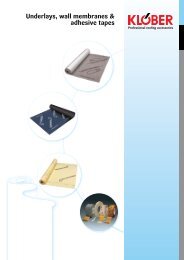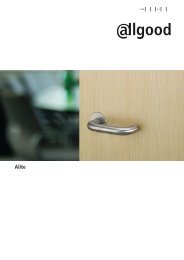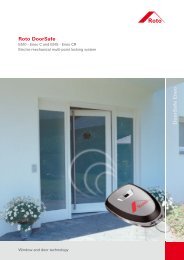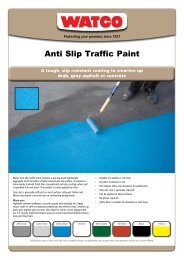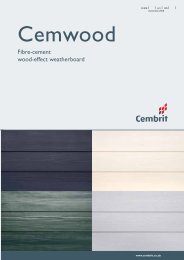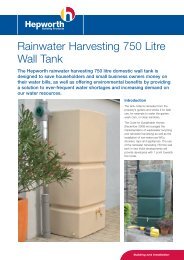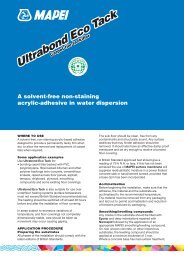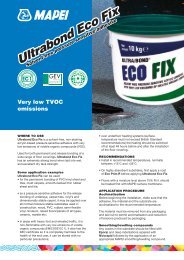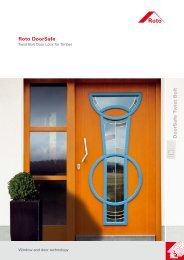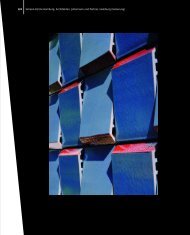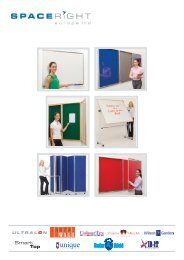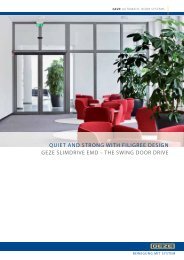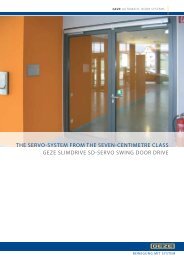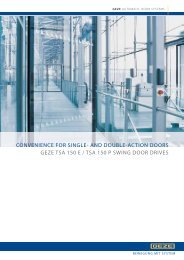Cembrit Cemsix
Cembrit Cemsix
Cembrit Cemsix
You also want an ePaper? Increase the reach of your titles
YUMPU automatically turns print PDFs into web optimized ePapers that Google loves.
Cl/SfB<br />
l (4-) Nf9 l l<br />
September 2011<br />
l<br />
Agricultural and Industrial<br />
Roofing and Cladding<br />
CEMSIX<br />
Corrugated sheets and accessories<br />
www.cembrit.co.uk
<strong>Cembrit</strong> companies have been manufacturing<br />
corrugated sheets since 1910. With nearly a<br />
century of production in fibre cement roofing<br />
and cladding, we are able to draw on experience<br />
of installation across the whole of Europe.<br />
Incorporating the latest technological advances, the fully accredited system of sheets<br />
allows designers to clad agricultural or industrial buildings in a Class 0 fire rated, rust<br />
and rot-proof material that has been in our built environment for decades and is<br />
available, ex-stock, in the UK. Manufactured using Portland cement, together with<br />
a formulation of superior blended synthetic and cellulose fibres, reinforced with<br />
strengthening strips and available with superior colouration systems, <strong>Cemsix</strong> is<br />
produced to the highest European standards.<br />
Quality Assurance<br />
<strong>Cemsix</strong> corrugated sheets are manufactured<br />
in accordance with a quality assurance system<br />
to BS EN ISO 9001:2008 (Certificate Numbers<br />
11000071 - PL11000074/P) and to the<br />
requirements of BS EN 494:2004 Class C1X.<br />
<strong>Cemsix</strong> has been awarded the BBA Certificate<br />
Number 03/4049.<br />
Environment<br />
<strong>Cemsix</strong> corrugated sheets are manufactured<br />
in accordance with the requirements of<br />
BS EN 14001:2004 (Certificate Numbers<br />
11000072 - PL11000074P).<br />
www.cembrit.co.uk
<strong>Cemsix</strong> Corrugated<br />
Sheets<br />
Produced in the traditional 6" UK profile with 6 corrugations and overlaps/<br />
underlaps on both sides of the sheet, <strong>Cemsix</strong> is available in three colouration<br />
types, all with matching accessories; traditional grey fibre-cement corrugated<br />
sheet, Cemscape/Sherwood ‘pre-weathered’ matt fibre-cement corrugated sheet<br />
and coloured corrugated sheet incorporating our unique 3 stage coating process.<br />
Natural Grey<br />
Cemscape/Sherwood<br />
Coloured<br />
Tile Red Spanish Red Laurel Green Olive Green Mocca<br />
Van Dyke Brown Cloud Grey Blue Blue/Black Black
www.cembrit.co.uk
<strong>Cemsix</strong> Corrugated<br />
Sheets<br />
Coloured<br />
top coat<br />
Primer coat<br />
Coated edges<br />
Anti-block<br />
on underside<br />
Blue/Black<br />
Polypropylene reinforcing strips<br />
Coloured<br />
edges and ends<br />
Technical Information<br />
Available sheet lengths<br />
<strong>Cemsix</strong><br />
Width<br />
Translucent<br />
Sheet<br />
<strong>Cemsix</strong> width trimmed<br />
for spaced roofing<br />
Overall width<br />
Net covering width<br />
Thickness (nominal)<br />
1086mm<br />
1016mm<br />
6.0mm<br />
1375mm (4’6”) 1086mm 1000mm<br />
1525mm (5’) 1086mm 3 1000mm<br />
1675mm (5’6”) 1086mm 3 1000mm<br />
Density (nominal) 1700kg/m 3<br />
1825mm (6’) 1086mm 3 1000mm<br />
Pitch of corrugations<br />
Overall depth<br />
Side lap<br />
Minimum end lap<br />
Maximum purlin centres<br />
Maximum rail centres<br />
Maximum unsupported overhang<br />
146.5mm<br />
54mm<br />
70mm<br />
150mm<br />
1375mm<br />
1825mm<br />
350mm<br />
1975mm (6’6”) 1086mm 3 1000mm<br />
2125mm (7’) 1086mm 3 1000mm<br />
2275mm (7’6”) 1086mm 1000mm<br />
2440mm (8’) 1086mm 3 1000mm<br />
2600mm (8’6”) 1086mm 3 1000mm<br />
2750mm (9’) 1086mm 3 1000mm<br />
2900mm (9’6”) 1086mm 3 1000mm<br />
Approximate weight of roof as laid, with<br />
150mm end laps, single skin including fixings 17 kg/m 2<br />
Minimum pitch 5º<br />
3050mm (10’) 1086mm 3 1000mm<br />
3660mm (12’) 1086mm 3 1000mm<br />
Translucent GRP rooflights are available in most common sheet lengths. They are used to provide natural<br />
illumination to the interior. These fragile sheets must be fixed correctly complying to British Standards and<br />
Health and Safety recommendations to reduce the risks of falls from height. Sheets must be fixed through<br />
each corrugation at every purlin. Side laps must be stitched to adjacent sheets at max 450mm centres.
www.cembrit.co.uk
<strong>Cemsix</strong> Corrugated<br />
Accessories<br />
<strong>Cemsix</strong> Barge Board<br />
<strong>Cemsix</strong> Roll Top Bargeboard<br />
One-piece Finial<br />
Used to close verge at gable ends.<br />
Nominal 200mm wing for single skin<br />
constructions and 300mm x 300mm<br />
for double skin.<br />
Lengths: 2400 and 3000mm<br />
Used to close verge at gable ends.<br />
Nominal 200mm wing for single skin<br />
constructions and 300mm x 300mm<br />
for double skin.<br />
Lengths: 1800mm (300mm x 300mm only),<br />
2500 mm and 3000mm<br />
Used as an alternative to cranked plain<br />
wing bargeboard.<br />
200mm x 200mm<br />
<strong>Cemsix</strong> Cranked<br />
Barge Board<br />
<strong>Cemsix</strong> Cranked<br />
Roll Top Bargboard<br />
Two-piece Roll<br />
Top Finial<br />
Closes verge apex when crown cranked ridge<br />
sheets are used.<br />
Available in 200mm x 200mm wing at<br />
1300mm girth (10º, 12.5º, 15º, 17.5º, 22.5º)<br />
and 2200mm girth (12.5º, 15º)<br />
Closes verge apex when crown cranked ridge<br />
sheets are used.<br />
Available in 1300mm girth<br />
300mm x 300mm wing (10º, 12.5º, 15º)<br />
200mm x 200mm wing (10º, 12.5º, 15º, 17.5º)<br />
Used as an alternative to cranked Roll Top<br />
Bargeboard.<br />
200mm wing x 360mm deep<br />
300mm wing x 500mm deep<br />
* Please note the 1800m cranked crown sheets are fragile and further reinforcement will be required to conform with HSG 33
<strong>Cemsix</strong> Cranked<br />
Crown Ridge<br />
<strong>Cemsix</strong> Two-piece<br />
Close Fitting Ridge<br />
<strong>Cemsix</strong> Two-piece<br />
Plain Wing Ridge<br />
To suit a variety of roof pitches. 3 Girths<br />
to provide smooth closure of roof apex.<br />
Available in 900mm (10º, 12.5º, 15º,<br />
17.5º, 22.5º)<br />
Available in 1200mm (12.5º, 15º)<br />
Available in 1800mm* (12.5º, 15º)<br />
Two piece ridge fitting adjustable to roof<br />
pitches not covered by standard cranked<br />
crown ridges.<br />
370mm wing<br />
Net cover: 1016mm<br />
350 x 350 wing<br />
Length: 1160mm<br />
Net cover: 1060mm<br />
<strong>Cemsix</strong> Cranked Crown<br />
Ventilation Ridge<br />
<strong>Cemsix</strong> Two-piece<br />
Ventilation Ridge<br />
<strong>Cemsix</strong> Open<br />
Protected Ridge<br />
Normally used in single-skin construction,<br />
particularly in agricultural buildings.<br />
This fitment may not be fully weatherproof<br />
in swirling snow or rain.<br />
Available in 900mm (12.5º, 15º, 17.5º, 22.5º)<br />
Available in 1800mm (12.5º, 15º)<br />
Two piece ridge fitting adjustable to roof<br />
pitches not covered by standard cranked<br />
crown ridges, to provide ventilation.<br />
Net cover: 1016mm<br />
Prevents rain ingress through ridge where<br />
sheets finish short to allow ventilation<br />
through apex of roof.<br />
1500mm long with spigot<br />
Net cover: 1350mm<br />
www.cembrit.co.uk
<strong>Cemsix</strong> Corrugated<br />
Accessories (continued)<br />
Plain Wing Angle Ridge<br />
<strong>Cemsix</strong> Movement Joint<br />
<strong>Cemsix</strong> Apron<br />
Flashing Piece<br />
300 x 300 wing<br />
5º to 60º in 5º increments<br />
Length: 1200mm<br />
Net cover: 1080mm<br />
Length: 3000mm<br />
Net cover: 311mm<br />
Used in long stretches of roofing and<br />
cladding to allow for expansion or<br />
structural building movement.<br />
Used where cladding changes from pitched<br />
to vertical or where sloping roof abuts a<br />
brick wall.<br />
Lengths: 1060mm left and right hand<br />
Net cover: 1016mm<br />
<strong>Cemsix</strong> GRP Eaves Closer<br />
<strong>Cemsix</strong> GRP Eaves Filler<br />
Used to prevent birds, vermin or wind<br />
driven particles entering at the eaves with<br />
a drip into the gutter.<br />
Net cover: 1016mm<br />
Used to prevent birds, vermin or wind driven<br />
particles entering at the eaves and provides a<br />
soffit to the underside of the sheets.<br />
Net cover: 1016mm
Performance<br />
Health and Safety<br />
The sheets incorporate polypropylene reinforcing strips for<br />
enhanced safety. They have been tested for fragility in accordance<br />
with ACR(M) 001:2000 test for fragile roof assemblies (to class<br />
C) Impact Resistance Test Method and BS EN 15057:2006 Fibre<br />
Cement Profiled Sheets.<br />
Any roof or wall clad in sheets should be treated as fragile.<br />
Care must be taken when working on roofs and the precautions<br />
detailed in BS 5502-20:90 regarding permanent walkways must<br />
be followed.<br />
Strength<br />
The sheets are denoted Class C1X, having a minimum<br />
breaking load of 4250Na and conform with the requirements<br />
of BS EN 494:2004.<br />
Fire<br />
When tested in accordance with BS 476-3:1958 sheets achieve<br />
an EXT.S.AA designation. When tested in accordance with<br />
BS 476-6:1989 and BS 476-7:1997 sheets had a fire propagation<br />
index of ≤3.5 sheets, a sub-index of ≤0.6 and a Class 1 surface.<br />
The sheets have a Class 0 surface and are deemed low risk and<br />
unrestricted by the requirements of National Building Regulations.<br />
Durability<br />
Evidence indicates that sheets should have a life far in excess<br />
of 30 years, with paint colour stability of 5 years. As with all<br />
cementitious material, the sheets will cure and weather over time.<br />
A 30 year guarantee is available on application.<br />
Installation<br />
<strong>Cemsix</strong> corrugated sheets are installed in accordance with<br />
BS 5502-21:1990, BS 5427-1:1976 and BS 8219:2001.<br />
www.cembrit.co.uk
Design Specifications<br />
Design<br />
<strong>Cemsix</strong> corrugated sheet can be fixed to steel or timber purlins.<br />
Fixing holes should be predrilled, or self drilling self tapping top fix fixings<br />
can be used. Fixing should be undertaken according to BS 8219:2001.<br />
PURLIN: the horizontal<br />
bars on the roof to which<br />
the sheets are fixed<br />
RAILS: the horizontal<br />
bars on the wall to which<br />
the sheets are fixed<br />
Direction of lay left to right<br />
Prevailing<br />
Wind Direction<br />
Purlin spacings should be a maximum of 1375mm<br />
with two fixings per purlin per sheet.
Design Specifications<br />
Mitring scheme<br />
To avoid having 4 layers of overlapping roof sheets,<br />
the corners of two sheets must be mitred.<br />
Each mitre must be cut straight and cleanly either<br />
by hand or by power saw. The angle and size of mitre<br />
is governed by the end and side lap dimensions. It is<br />
recommended that a good quality butyl mastic strip<br />
is used to seal the overlapping sheets to provide a<br />
weatherproof join. Two corners of opposing sheets<br />
should be mitred the equivalent of the head and side<br />
lap (i.e. maximum 70mm x 150mm) with a gap between<br />
sheets of 3-6mm.<br />
150mm<br />
3 to 6mm<br />
Sheets on the perimeter of the roof will have one mitre<br />
(except the first and last sheets which remain complete),<br />
all other sheets will therefore have two mitres.<br />
70mm<br />
Sheets are laid from eaves to ridge one column at a<br />
time, with the side lap corresponding to the prevailing<br />
wind direction. On duo pitched roofs opposing<br />
columns of sheets should be installed sequentially<br />
to assist in locating the cranked crown (see below).<br />
150mm<br />
Laying sequence<br />
4<br />
11<br />
Ridge<br />
5<br />
12<br />
Ridge<br />
course<br />
Mitre<br />
6<br />
13<br />
7<br />
14<br />
Cranked<br />
Crown Ridge<br />
Intermediate<br />
courses<br />
Mitre<br />
150 mm to<br />
300mm end lap<br />
3<br />
10<br />
Eaves<br />
course<br />
2<br />
9<br />
Wind Direction<br />
1<br />
8<br />
www.cembrit.co.uk
Design Specifications<br />
Overlap sealing – see tables on opposite page<br />
The overlaps on low pitched roofs should be sealed with butyl<br />
strips, creating a windproof joint and protecting the fixing holes<br />
from wind driven precipitation.<br />
Butyl Strip<br />
Prevailing<br />
Wind Direction<br />
Example<br />
In this example lay right to left so side lap is protected from prevailing wind.
Sheltered to moderate sites<br />
Less than 56.5 l/m 2 of wind-driven rain per spell<br />
Minimum<br />
Roof pitch<br />
Minimum<br />
End lap<br />
End laps<br />
treatment<br />
Side laps<br />
treatment<br />
≥22 1 /2° 150mm Unsealed Unsealed<br />
≥15° 300mm Unsealed Unsealed<br />
≥15° 150mm Sealed Unsealed<br />
≥10° 150mm Sealed Sealed<br />
≥5° * 300mm Double sealed Sealed<br />
* The minimum pitch for <strong>Cemsix</strong> corrugated sheet is 5º. On roof<br />
pitches between 5º and 10º the maximum slope length is 15m.<br />
For longer spans please contact <strong>Cembrit</strong> for advice.<br />
Moderate to severe sites<br />
Less than 56.5 l/m 2 of wind-driven rain per spell<br />
Minimum<br />
Roof pitch<br />
Minimum<br />
End lap<br />
End laps<br />
treatment<br />
Side laps<br />
treatment<br />
≥25° 150mm Unsealed Unsealed<br />
≥17 1 /2° 150mm Sealed Unsealed<br />
≥15° 150mm Sealed Sealed<br />
≥10° 300mm Sealed Sealed<br />
≥5° * 300mm Double sealed Sealed<br />
* The minimum pitch for <strong>Cemsix</strong> corrugated sheet is 5º. On roof<br />
pitches between 5º and 10º the maximum slope length is 15m.<br />
For longer spans please contact <strong>Cembrit</strong> for advice.<br />
www.cembrit.co.uk
Design Specifications<br />
Site Dust<br />
If cutting or drilling<br />
sheets is likely<br />
to result in dust<br />
generation, adequate<br />
ventilation and/or<br />
protection must<br />
be provided. Health<br />
and Safety Executive<br />
Guidance Note<br />
EH 44 Dust in<br />
the Workplace:<br />
general principles<br />
of protection should<br />
be followed.<br />
Standard Roofing<br />
Nominal<br />
depth<br />
54mm<br />
Spaced Roofing<br />
Nominal<br />
depth<br />
54mm<br />
lap<br />
70mm<br />
Fixing<br />
Fixing<br />
Nominal pitch<br />
146.5mm<br />
nominal width 1086mm<br />
net cover 1000mm<br />
Nominal pitch<br />
146.5mm<br />
net cover 1016mm<br />
Fixing<br />
Fixing
Design Specifications<br />
Sheet fixing<br />
Pre-drilling<br />
Every sheet should be twice fixed at each purlin.<br />
It is extremely important that the<br />
correct roof purlins/rail system,<br />
type of fixing and washers are<br />
selected, to eliminate leakage/<br />
corrosion and the general<br />
deterioration of the construction.<br />
It is recommended that a self-drilling<br />
Top-Fix screw is adopted. This<br />
simple method offers a fast, lowcost<br />
fixing solution. Using a highspeed<br />
screw gun, drive in the fixing.<br />
The fixing system is only suitable for<br />
roofs up to and including 30º pitch.<br />
Using a tungsten carbide tipped drill<br />
at 90º angle to the sheet, drill a hole<br />
2mm larger than the selected fixing.<br />
The drill point should be no less than<br />
60º to the sheet. Always drill at the<br />
‘apex’ of the profile. Do not fix a<br />
sheet in the ‘valley’ or on a ‘slope’<br />
of the profile.<br />
NEVER hammer fixing through<br />
the sheet. This will invalidate the<br />
guarantee. Fibre-cement sheets<br />
will shatter under impact and<br />
subsequently allow water to<br />
penetrate the apparent fixing.<br />
ALWAYS pre-drill.<br />
To achieve a watertight and<br />
weathertight seal, it is important to<br />
confirm that the sealing washer is<br />
correctly tightened. Not over tight,<br />
not too loose. After a period of time,<br />
when the material has settled, the<br />
fixings may require re-tightening<br />
with hand tools. Be sure to use<br />
roof ladders to avoid walking on<br />
the roof sheets.<br />
Note: Where <strong>Cemsix</strong> is used as a vertical cladding, sheets should be fixed in the valley of the 1st corrugation in from the overlap.<br />
The following screws and washers are available ex-stock:<br />
120mm drive screws for timber purlins.<br />
105mm screws for Zed purlins between 1.6mm<br />
and 2.5mm thick steel.<br />
110mm self drilling steel screws for hot rolled steel<br />
between 3mm and 6mm thick steel.<br />
130mm screws for timber purlins.<br />
www.cembrit.co.uk
Storage<br />
and handling<br />
1. Coloured sheets and accessories should ideally be stored inside a<br />
building. Until the sheets are in position on the building they could<br />
be subject to damage from site debris and accidental collision.<br />
Rainwater, condensation and extreme weather conditions can<br />
also adversely affect the sheets (particularly coloured sheets)<br />
during storage.<br />
2. Stacks without additional timber cross bearers should not<br />
exceed 1200mm. Cross bearers should be no more than one<br />
metre apart. Different length sheets should ideally be stacked<br />
separately, but if stacked with longer sheets they must be laid<br />
on the top and their cross bearers must line up vertically.<br />
3. The sheets are supplied covered in shrink-wrapping.<br />
It is strongly recommended that the wrapping is NOT<br />
removed until the sheets are required for fixing. Should<br />
any sheets remain at the end of the working period the<br />
edges MUST BE COVERED.<br />
4. If several stacks are to be laid one on top of the other,<br />
timber cross bearers should be placed at 50mm intervals<br />
up to a maximum height of 300mm<br />
It is important that the ground is level and firm.<br />
If it is not possible to store the<br />
product inside a building, a suitable<br />
site should be selected. The ground<br />
should be firm and level and as<br />
close to the construction work as<br />
possible. The sheets must be stacked<br />
on cross bearers, thus raising them<br />
off the ground. A simple protective<br />
frame should be constructed and<br />
covered with a waterproof material.<br />
Air must be allowed to circulate all<br />
round the stack. The whole frame and<br />
stack should be tilted to encourage<br />
rainwater to drain freely.<br />
Crane handling should be careful<br />
to avoid damage to the edges of<br />
the sheets. Use rope slings (not<br />
chains) and over-width spreaders to<br />
eliminate the possibility of damaging<br />
the edges of the sheets.<br />
The corners of the sheets are<br />
particularly vulnerable during<br />
transportation.<br />
Whether the product is stored<br />
inside or outside, the stacks should<br />
be regularly inspected to ensure<br />
that moisture has not penetrated<br />
the coverings. Coloured sheets are<br />
particularly vulnerable at this stage.<br />
Never push, drag or slide a sheet<br />
from a stack. Always consciously<br />
remove the sheet by lifting from<br />
the stack. Similarly, lift the sheet into<br />
position on a roof, do not push or<br />
drag over the purlins or other<br />
roof sheets.<br />
Recycling centre
www.cembrit.co.uk<br />
Sports Pavilion
The information contained in this publication and otherwise supplied<br />
to users of the company’s products is based on the company’s general<br />
experience, best knowledge and belief. However, because of factors<br />
beyond the company’s knowledge and control, which can affect the<br />
use of the products, no warranty is given or implied with respect to<br />
such information.<br />
The company’s policy is one of continuous improvement.<br />
<strong>Cembrit</strong> Limited therefore reserves the right to alter specifications<br />
at any time and without notice.<br />
<strong>Cembrit</strong> Ltd<br />
57 Kellner Road<br />
London<br />
SE28 0AX<br />
Tel: +44 (0)20 8301 8900<br />
Fax: +44 (0)20 8301 8901<br />
sales@cembrit.co.uk<br />
As with all manufactured materials, colours and textures of corrugated<br />
sheets and accessories may vary according to light and weather conditions.<br />
It is advisable to ask for samples of sheets prior to specification and<br />
purchase. Owing to this and limitations of the printing process, colours<br />
of sheets in this brochure may only be taken as indicative.<br />
Please ensure that you have the latest version of this datasheet by<br />
checking that the publication date on the top right of the front cover<br />
corresponds with the downloadable version on our website.<br />
Branch listings<br />
5<br />
1 London * T +44 (0)20 8301 8900<br />
2 Southampton T +44 (0)23 8061 5631<br />
3 Bovey Tracey T +44 (0)1626 835722<br />
4 Llandow * T +44 (0)1446 773777<br />
5 Normanton * T +44 (0)1924 890890<br />
3<br />
4<br />
2<br />
1<br />
* Main corrugated sheet branch<br />
www.cembrit.co.uk



